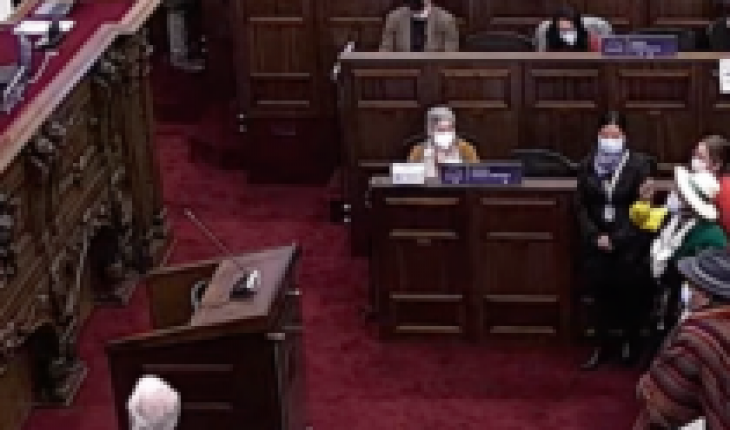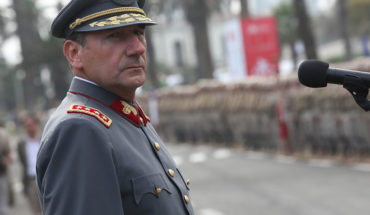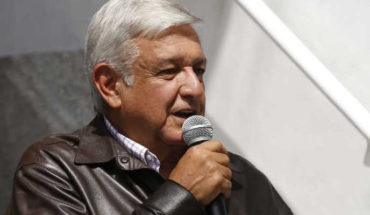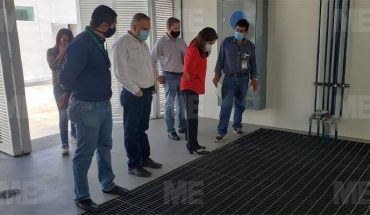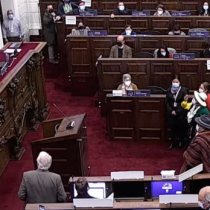
Since pelao Vade recognized his lie, there is almost no talk of anything else. Those who have despised this process since before it began, mock with a swinging jaw. Those who gave it a chance, sniff out disappointment. Its most committed advocates are sad or worried, as are many constituents. After the news broke, virtually everyone I called was shocked.
Very few defended him arm-in-arm, like Alejandra Pérez, who blamed the press for revealing his lie – instead of him for carrying it out – and then he was seen crying in the chamber. The first statement of the table was judged too lukewarm. “We deeply regret what happened with the conventional Rodrigo Rojas Vade and empathize with the pain that this situation causes. Given the seriousness of the facts, we have accepted the resignation that Mr. Rojas has presented this afternoon to the Deputy Vice Presidency of the Convention.” He added: “… we will initiate the corresponding internal procedures.”
With the passing of the hours and the increase of the siege, the contemplations gave way to the urgency to get this problem off our backs. The discredit of the convention seemed to grow rapidly. Paradoxically, although the vast majority of its members agree that he should lose his post, the law prevents him from doing so. There are very few arguments that the Constitution accepts to strip an elected parliamentarian of his seat, and the same rule applies to constituents. The popular will cannot be contradicted, just as it is, by the decision of a few. Various alternatives have circulated: the diagnosis of a disabling disease, which is absent from the country until it falls into one of the causes, the revelation of scams linked to his lie -on Monday, Elisa Loncón and Jaime Bassa presented a letter to the Prosecutor’s Office for possible crimes that he would have committed in his declaration of patrimony and interests-, hope that a rule of the Regulation makes it possible … Each of them has its complication. The hope that Pelao Vade will ratify his willingness to leave the Convention, expressed by himself in his interview with La Tercera, receded when a statement was released in which he assured: “… I will defend myself in court, because I am not a criminal, I am someone who was wrong.”
More here than it is disastrous for the prestige of the Convention, it is difficult to imagine how the Pelao he could continue to attend, take the floor, discuss a law, or simply sit on some bench in the gardens, without suffering the reprobative bombardment of all the eyes and cameras around him. Very few have been able to talk to him; someone said he was hospitalized; another that an airtight group was in charge of containing it. “He doesn’t dare to go out on the street,” they confided to me. “Imagine, it’s the most recognizable thing in the world.” His bald head, hoops and piercings, bare torso turned into a banner – “if there is life, there is resistance” – and intravenous needles attached at chest height, made him an iconic image. Posters with his figure appeared. Impossible to go unnoticed.
On Thursday, September 9, President Loncón opened the 18th Plenary Session wishing “that all this goes in the right direction, with good reasoning.” He gave the floor to “Don John”, our secretary, to report on the communications received, and then opened the debate on how we would vote on the rules of procedure and those rules in which the bureau proposed to apply the quorum of 2/3. Roberto Vega of RN argued that the same quorum should apply to several other rules; Marcos Barraza, of the PC, asked to clarify whether these decisions came from the secretariat (“Don John”) or from the table, and demanded that this quorum be applied to norms raised by the native peoples.
The questioning of the modality proposed by the table forced President Loncón to recognize that there had been a lack of dialogue and to justify this lack by the distractions caused by Rojas Vade’s lie. The day before, the police entered the Congress building to take her and Vice President Jaime Bassa to the PDI offices, where they spent the whole afternoon taking statements about the case. “You can’t imagine what these last 5 or 6 days have been like,” Bassa argued. “It has been difficult to organize this work,” he continued, “the board of directors still has no rules for the establishment of its competences, and as long as there are none, we must still exercise some function to direct the debate and for this to work … so I ask you for a little understanding… patience and temperance, before going out to be scandalized by social networks.”
Isabel Godoy, Hugo Gutiérrez and Ruggero Cozzi spoke, and during the period of silence that While the table debated how to continue, Marcela Cubillos began to move her arms as if swimming in the air to be given the floor, Barraza and Gutiérrez toured the hemicycle speaking in the ear of representatives of the native peoples, and most concentrated on their smartphones.
Elisa Loncón broke the parenthesis to give the floor to the machi Francisca Linconao, explaining that the ancestral authority, now entirely dressed in purple, felt bad, and before leaving the hemicycle, she would leave us a message that she read quickly in Mapudungun and then calmly translated another Mapuche next to her. There was such a difference in time between the versions in one language and another, that I couldn’t help but wonder if they would say the same thing. “We are a sovereign and autonomous constitutional convention. We do not want 2/3 and we are going to defend our autonomy, just as the Mapuche have defended our autonomy for more than 500 years,” said the translator.
Marcela Cubillos continued with her arms raised, now loudly claiming why the word was given to the machi and not to her. “It is not contemplated to give the floor now,” Bassa replied, “and if the machi was given, it is for health reasons.” At the insistence, however, they decided to allow 5 more conventionals to speak, and she in the first place. Like his antagonist, the communist Gutierrez, he also demanded more time for debate, because everyone should be able to demonstrate in the face of such momentous decisions. Both extremes agreed to question the table. “We are in a constituent space,” said Natalia Henríquez, of the former People’s List, after warning that she would try to express herself as calmly as possible, “and therefore the only ones who have power, a delegated power, is the plenary, but in no case resides at the table … Trust in her is lost when you act badly,” he concluded.
Several approached the testera. The vice president called for “order in the room.” The Aymara Isabella Mamani, the Quechua Wilfredo Bacián, the chango Fernando Tirado and the colla Isabel Godoy gathered in the hall of the hemicycle and ignoring the calls to order that Jaime Bassa insistently made – “order in the room! order in the room!” – rebuked the table. “When there is a triumph,” Isabel Godoy shouted at them, “it is the table, and when there is the shit, it is the ampliá table.” In that, constituents from the other chambers began to arrive, claiming that because they were not in the plenary, no one gave them the floor. Disorder spread. Bassa said that was how the convention was put at risk. The Chairperson rang her bell and declared the sitting suspended.
Already between the columns of the atrium, the versions about the background of what happened multiplied. Some said that John Smock had torn off with the jars, others that the table was not working, that the real trigger had been to ignore Elisa Giustinianovich when she asked for the floor from her room, that the 2/3 for here and the 2/3 for there. Members of the former People’s List rushed to give a public statement in front of the media. Camila Zárate called on her comrades of the revolt to demonstrate to prevent this immovable quorum from being established. Agustín Squella, from the side, argued that this type of attitude was unacceptable. Teresa Marinovich passed by me and commented that that day she had thought of arriving dressed in huasa, but she was dissuaded by the wearing of a performance like that of her being related to Pamela Jiles.
Between the disorder and the murmur, however, the Socialist Collective -of which I am now part-, the amplista fronts, the INN and those of the Apruebo, distanced themselves from the batahola to coordinate actions conducive to the institutionalization of the process. Militants from the most dialoguing sector of the right -evidencing that with their backs to the spectacular, the Convention advances-, approached constitutional of these groups to share their impressions and alternative solutions to agree.
With the approval of the Regulations, the end of the People’s List (as we knew it), the demystification of the performative personalities and their corresponding loss of extortion force, the period of installation of the Constituent Process ends, where identities, neglected experiences, accumulated pains and debts of all kinds occupied a necessary leading place. It was not imaginable that this story would start without first that Chile made invisible by the cupular agreements, which evidenced its crisis with the social explosion, showed itself breaking its composure.
Now we have to move from expressiveness, the symbolic and the emotional, to the conceptualization of the norms that will govern our future coexistence. It is not a question of avenging the past, but of building the future. Overcome fear and anger, to give rise to a new social pact thatA democracy in which no one is worth more than another, without official truths or fears when it comes to showing differences, where no card of the card about and the dignity of each one is fully recognized.
We commemorate a new September 11. I went with my two children to the front of the National Stadium. This time, I didn’t do it for me, but for them. We lit candles under the photos of men and women who lost track of them there. I told them about that country where intolerance and cruelty reigned with self-confidence. I noticed in their innocent faces the lightness of those who will never be able to fully figure out how appalling a dictatorship can be, without living it. I tried to share their radical judgments, but I feared them as I struggled. Back home, I tried to explain to them what this constituent process meant to me. “It’s not,” I told them, “about building a perfect world. If everyone finds in it the possibility of sharing it, we should be proud”
translated from Spanish: Order in the room!
September 12, 2021 |
